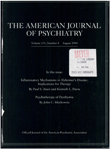Measuring the determinants of work values for psychiatrists' services in the resource-based relative value scale study
Abstract
OBJECTIVE: As part of the Harvard resource-based relative value scale study, the authors investigated how well the codes in the Physician's Current Procedural Terminology, 4th edition, or CPT-4, match psychiatric services to the work involved in evaluating and managing patients and how patient care characteristics affect different levels of psychiatric work. METHOD: A random sample of over 200 psychiatrists and subspecialists was asked to use 68 typical clinical examples or vignettes to evaluate services described by CPT codes. Data were analyzed by multivariate statistical methods. RESULTS: The survey showed that the existing coding system does not adequately describe the work that psychiatrists do. Within a single code (e.g., 90844, individual medical psychotherapy), there was wide (more than twofold) variation in the estimates, from multiple measurements based on different vignettes, of the amount of work represented. Estimates of work values varied significantly according to treatment setting and patient characteristics: psychiatric services in the hospital showed an average work value 25% greater than that for office services; treating new patients involved 18% more effort than treating established patients; and treating patients described as at risk of harming self or others increased the psychiatrists' work effort by 36%. CONCLUSIONS: Revisions in coding evaluation and management services in the new Medicare fee schedule for psychiatric services should be further refined and then implemented. These revisions would bring the coding system into line with psychiatric practice, making it a better way of accounting for the relative work involved in treating patients of varying difficulty.
Access content
To read the fulltext, please use one of the options below to sign in or purchase access.- Personal login
- Institutional Login
- Sign in via OpenAthens
- Register for access
-
Please login/register if you wish to pair your device and check access availability.
Not a subscriber?
PsychiatryOnline subscription options offer access to the DSM-5 library, books, journals, CME, and patient resources. This all-in-one virtual library provides psychiatrists and mental health professionals with key resources for diagnosis, treatment, research, and professional development.
Need more help? PsychiatryOnline Customer Service may be reached by emailing [email protected] or by calling 800-368-5777 (in the U.S.) or 703-907-7322 (outside the U.S.).



